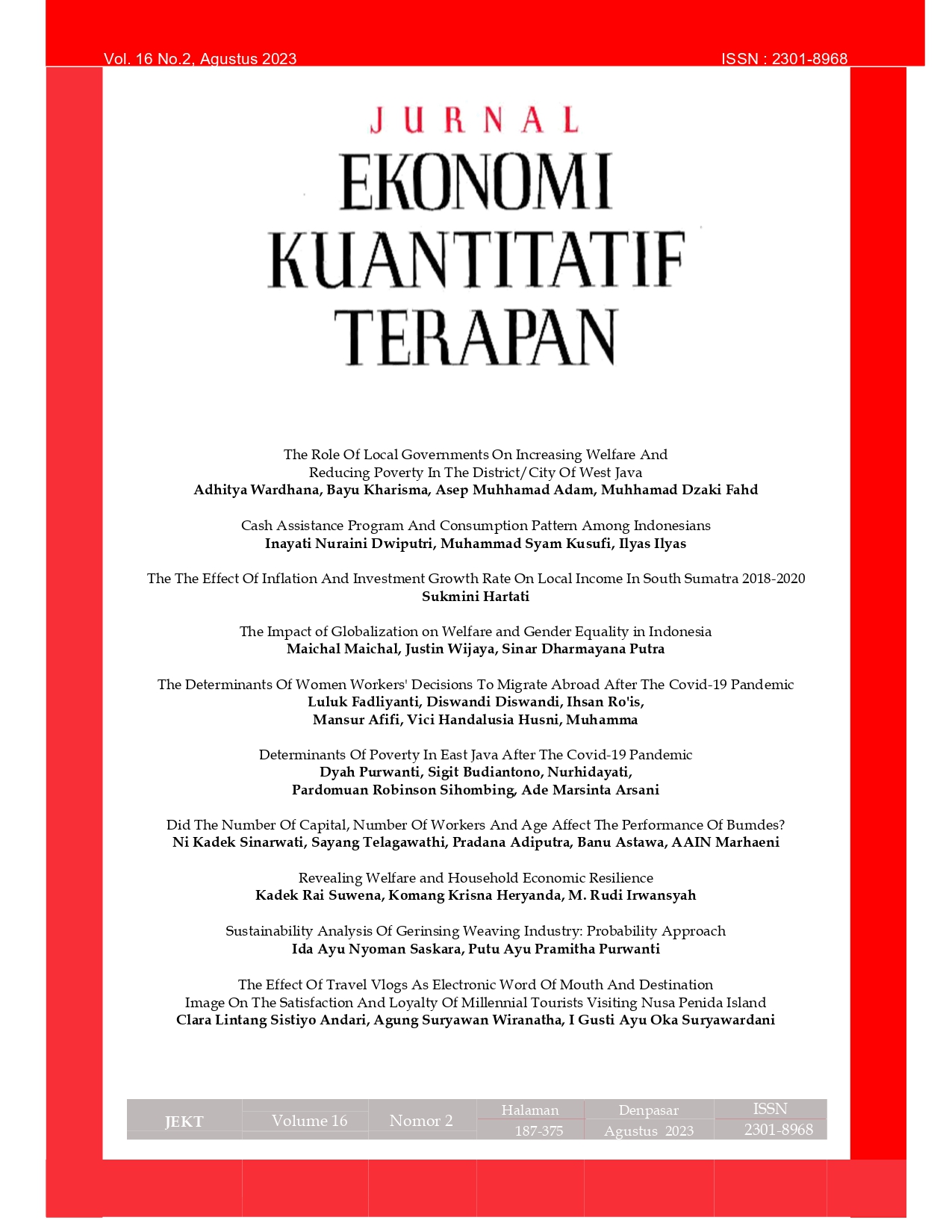The Role Of Local Governments On Increasing Welfare And Reducing Poverty In The District/City Of West Java
Abstract
Abstrak
Dalam era desentralisasi pemerintah daerah diberikan kewenangan untuk mengelola keuangan secara mandiri salah satunya adalah peningkatan kesejahteraan masyarakat. Provinsi Jawa Barat merupakan salah satu daerah dengan iklim investasi yang kondusif dan banyaknya pusat pertumbuhan di beberapa daerah memiliki tingkat kesejahteraan yang rendah. Penelitian ini bertujuan untuk melihat bagaimana peran keuangan pemerintah dalam meningkatkan kesejahteraan masyarakat di Kabupaten/Kota Provinsi Jawa Barat dengan periode 5 tahun dari 2016 hingga 2020. Penelitian ini menggunakan analisis kuantitatif berupa grafik kuadran dan cross tabulation serta analisis regresi dengan metode Generalized Least Square (GLS). Hasil analisis menunjukkan bahwa secara umum kabupaten/kota di Jawa Barat masih memiliki ketergantungan terhadap dana transfer pusat dalam upaya peningkatan kesejahteraan dan penurunan kemiskinan. Selanjutnya, masih banyak kabupaten/kota yang belum mampu mengoptimalkan penerimaan daerah sehingga kesejahteraan tidak dapat dioptimalkan. Sementara itu, hasil analisis regresi menunjukkan bahwa dana perimbangan memiliki pengaruh paling kuat terhadap peningkatan pendapatan perkapita, IPM dan penurunan kemiskinan.
Kata Kunci: Pengeluaran pemerintah, IPM, Pendapatan perkapita, Kemiskinan, Generalized Least Square
Downloads
References
Anderson, E., d’Orey, M. A. J., Duvendack, M., & Esposito, L. (2018). Does Government Spending Affect Income Poverty? A Meta-regression Analysis. World Development, 103, 60–71. https://doi.org/10.1016/J.WORLDDEV.2017.10.006
Appiah, E. N. (2017). The Effect of Education Expenditure on Per Capita GDP in Developing Countries. International Journal of Economics and Finance, 9(10). https://doi.org/10.5539/ijef.v9n10p136
Arsyad, M., Jabuddin, L. O., Aida, S., Taridala, A., Bafadal, A., Tinaprilla, N., Padangaran, A. M., Sani, A., & Aida, S. (2020). Impact of Government Expenditure on Agricultural Output and Poverty . International Journal of Advanced Science and Technology, 29(6), 1640–1649. https://www.researchgate.net/publication/344304991
Canare, T. (2021). Decentralization and welfare: Evidence from a panel of countries. Annals of Public and Cooperative Economics, October 2020, 1–30. https://doi.org/10.1111/apce.12327
Craigwell, R., Bynoe, D., & Lowe, S. (2012). The effectiveness of government expenditure on education and health care in the Caribbean. International Journal of Development Issues, 11(1), 4–18. https://doi.org/10.1108/14468951211213831
Ebingha, E. E., Eni, J. S., & Okpa, J. T. (2019). Population Growth And Socio-Economic Development Of Cross River State, Nigeria. European Journal of Economic and Financial Research, 0(0). https://doi.org/10.46827/EJEFR.V0I0.512
Edeme, R. K., & Nkalu, C. N. (2019). Public Expenditure and Human Development in Nigeria in The Last Decade, Composition and Distributional Impacts. Economics and Business Letters, 8(2), 62–73. https://doi.org/10.17811/ebl.8.2.2019.62-73
Fadilah, A., Ananda, C. F., & Kaluge, D. (2018). A Panel Approach : How Does Government Expenditure Influence Human Development Index ? Jurnal Ekonomi Dan Studi Pembangunan, 10(2), 130–139.
Haile, F., & Niño-Zarazúa, M. (2018). Does Social Spending Improve Welfare in Low-income and Middle-income Countries? Journal of International Development, 30(3), 367–398. https://doi.org/10.1002/JID.3326
Hao, Y., Chen, Y. F., Liao, H., & Wei, Y. M. (2020). China’s fiscal decentralization and environmental quality: theory and an empirical study. Environment and Development Economics, 25(2), 159–181. https://doi.org/10.1017/S1355770X19000263
Hasan, M. S. (2010). The long-run relationship between population and per capita income growth in China. Journal of Policy Modeling, 32(3), 355–372. https://doi.org/10.1016/J.JPOLMOD.2009.09.005
Hsiao, C. (2007). Panel data analysis-advantages and challenges. Test, 16(1), 1–22. https://doi.org/10.1007/s11749-007-0046-x
Juliarini, A. (2020). EFFECT OF REGIONAL REVENUE ON THE HUMAN DEVELOPMENT INDEX (HDI) IN THE PROVINCES OF WEST PAPUA AND PAPUA, INDONESIA. Simposium Nasional Keuangan Negara, 2(1), 335–354. https://jurnal.bppk.kemenkeu.go.id/snkn/article/view/547
Mohammad, S., & Razmi, J. (2012). Investigating the Effect of Government Health Expenditure on HDI in Iran. Journal of Knowledge Management, Economics and Information Technology, 2(5), 126–139.
Mutiha, A. H. (2018). The Effect of Regional Own-source Revenue, Tax Revenue-sharing Fund, General Allocation Fund and Special Allocation Fund to the Human Development Index (Based on the Study of Provincial Government in Indonesia). KnE Social Sciences, 3(11), 609–624–609–624. https://doi.org/10.18502/KSS.V3I11.2792
Nursini, N., Sulawesi, M. S., Pandang, U., & Sulawesi, S. (2019). POVERTY ALLEVIATION IN THE CONTEX OF FISCAL DECENTRALIZATION IN. 12(1). https://doi.org/10.14254/2071-789X.2019/12-1/16
Safitri, I. (2016). Pengaruh Pengeluaran Pemerintah Sektor Kesehatan, Pendidikan, Dan Infrastruktur Terhadap Indeks Pembangunan Manusia Di Provinsi Aceh. Jurnal Ilmiah Mahasiswa, 1(1), 66–76.
Soejoto, A., & Tjipto Subroto, W. (2015). Fiscal Decentralization Policy in Promoting Indonesia Human Development. International Journal of Economics and Financial Issues, 5(3), 763. http:www.econjournals.com




















